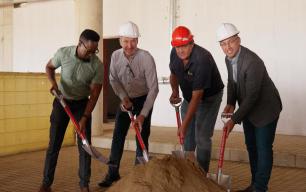Prepare for oil and gas boom says education council

- By Patience Makwele
As Namibia grows closer to an energy transformation which may reshape its economy, the National Council for Higher Education (NCHE) has urged locals to prepare for the oil and gas industry. This remarks were made during a public lecture which took place in Windhoek last week under the theme, ‘skill needs for Namibia’s emerging oil and gas industry’.
Speaking at the event Michael Love, head of skills policy at OPITO, an international energy training body, reiterated the urgency of equipping Namibians with the right skills to meet the demands of the oil, gas and hydrogen industries.
“Skills are the bridge between potential and prosperity.
The decisions made today will determine whether this country builds an energy industry that benefits all or one that bypasses too many,” explained Love. The Scottish-born policy expert grew up in Aberdeen during that city’s oil and gas boom, highlighted the human, economic and technical stakes Namibia faces as it prepares to develop its offshore oil and green hydrogen resources.
“As we gather here today, the eyes of the global energy industry are increasingly focused on this great country. Drawn by the promise of offshore reserves and a pioneering commitment to hydrogen development, among other things,” he said.
According to Love alongside this excitement comes the need for careful, deliberate planning, particularly in developing the skills and workforce capacity needed to seize this opportunity sustainably. Recent oil discoveries in Namibia’s Orange Basin by Shell, TotalEnergies, and Galp Energia, along with Hyphen’s green hydrogen project, are expected to bring thousands of jobs and boost local GDP by over 5 percent.
However, as it stands, the country has only two registered petroleum engineers and just over 5 percent of tertiary graduates possess qualifications relevant to the energy sector. “This is not criticism. It is context. Namibia is entering a brand-new chapter. Until now, there has been no real oil and gas sector. Skills planning understandably reflects the economy as it was. But that now must change,” Love noted.
He further outlined a broad spectrum of roles Namibia must urgently prepare for from welders, pipefitters and crane operators to marine technicians, safety officers and digital analysts. These roles, he said, are not out of reach for Namibians but they demand intentional investment in training infrastructure, public-private partnerships and policy alignment.
He also acknowledged the efforts already under way through institutions such as the Namibia University of Science and Technology (NUST)’s Centre for Oil & Gas, PETROFUND, and the Namibian Institute of Mining and Technology (NIMT).
Love called for the establishment of a national oil and gas safety framework, which aligns with international best practices and is enforced through licensing conditions.
“These are not just compliance tools. They save lives. They enhance operational efficiency. And they open doors to international employment.” During the event, NCHE Chairperson Prof. Samuel John reflected on the importance of timely and responsive public dialogue in education.
“As a council, we have consistently held public lectures for over 13 years, enabling us to engage the public in discourses that are topical and relevant to higher education issues in Namibia,” said John.
“The government has prioritized human capital development, and the oil and gas industry shows great potential demand for a skilled workforce in the near future. Therefore, as higher education coordinators and regulators, it became necessary to engage industry experts and the public to establish the skills needs and standards that trainees and training providers should meet.”
- 248 views










Comments